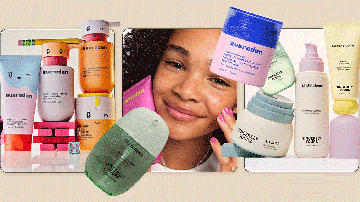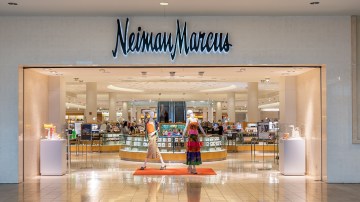Last year, the Chanel-owned and London-based luxury brand Orlebar Brown was focused on a U.S. retail expansion. Now, the 18-year-old brand is turning its sights to new retail horizons across Southeast Asia and the Middle East.
After opening eight new stores in places like Mexico, the Virgin Islands and California, Orlebar Brown now plans to open 10 more stores around the world in 2025, the most it’s opened in a single year. They include a second store in Abu Dhabi and three stores in Thailand, marking the brand’s first presence in Southeast Asia. It’s a nearly 20% increase in Orlebar Brown’s retail presence, which currently numbers nearly 50 stores.
Orlebar Brown is primarily focused on swimwear but has in recent years introduced more apparel and resortwear into its collection. Trevor Hardy, Orlebar Brown’s CMO, told Glossy that the brand has a simple strategy for where it opens stores: It follows the customer.
“We look at the density of customers, and we’ve seen that we have a fair number of customers ordering from Singapore and Bangkok, [for example],” Hardy said. “And we do some research before we step into that market. Every city in every region behaves differently.”
Hardy said regions like Asia and Australia tend to have more of a mall culture, so two of Orlebar Brown’s Thailand stores are in major shopping malls EmQuartier and Icon Siam, both in Bangkok. Meanwhile, in destination locations like St. Barths and St. Regis, Orlebar Brown has opened stores within resorts and hotels, including the Eden Rock Hotel in St. Barths and the Rosewood Hotel in St. Regis.
But there’s an even bigger Asian market opportunity looming. Even with the 20% decline in the Chinese luxury market in the last year, it’s still one of the biggest economies globally for luxury brands. But Hardy said Orlebar Brown doesn’t have any immediate plans to open stores there just yet.
“We haven’t taken a serious look at China yet,” he said. “We just don’t have many Chinese customers yet. When we do, we’ll consider opening a store there. We have some decent wholesale in Japan and some online sales in South Korea. But Thailand was what we had our eye on for a long time, and India is another region we’re really interested in.”
After the 10 new stores this year, Hardy said the retail openings will likely slow down for a bit, with a few in-resort stores but fewer standalone or mall stores. Instead, Orlebar Brown will focus on cultivating an audience in the regions where it’s already present.
“Stores are our best billboards,” Hardy said. “It’s the most expensive type of advertising, but they are a great way to bring people into the brand. Ultimately, sales are what really matters, but we look at repeat purchases as another measure of how well our stores are doing at clienteling and cultivating this loyal audience.”
Thailand also has a timely connection for Orlebar Brown. The third season of HBO’s popular dark comedy, “The White Lotus,” is in the middle of an acclaimed third season set at a luxurious resort in Thailand. It’s exactly the kind of setting where you’d expect to see people wearing Orlebar Brown’s $400 swim trunks. Orlebar Brown’s apparel has been featured in all three seasons of “The White Lotus,” although there was no official product placement deal. Orlebar Brown’s parent company, Chanel, is privately held and hasn’t disclosed revenue since 2023, when its sales rose to nearly $20 billion.
Orlebar Brown isn’t the only luxury brand interested in Thailand. In addition to Singapore, Thailand has emerged as a veritable luxury hub, with a luxury market valued at $5 billion as of the end of 2024. According to eMarketer, Thailand has the third highest rate of ultra-high-net-worth individuals, or people with more than $30 million in personal wealth, of any nation in China. Thai celebrities are also frequently becoming luxury ambassadors. In the last year, Gucci began working with actress Davika “Mai” Hoorne, Prada with Metawin “Win” Opas-iamkajorn and Dior with Tontawan Tantivejakul.
Thailand is also less likely to be directly hit by President Trump’s aggressive tariffs toward China, which have caused headaches and consternation for international brands trying to navigate tricky trade wars.
“It does feel tricky,” Hardy said of trying to operate an international business in this environment. “It’s a bit dystopian in some ways. There’s massive economic uncertainty for consumers. There are concerns that the customer won’t have as much disposable income in the months and years ahead. Plus, there are tariffs and a lot of other destabilizing forces globally. It’s really hard to plan for things right now.”




